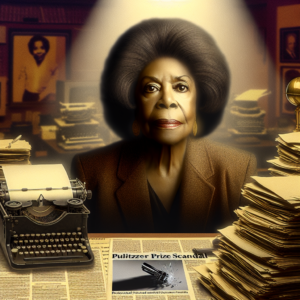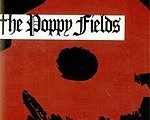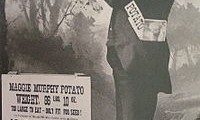American former journalist
Janet Leslie Cooke (born July 23, 1954) is an American former journalist. An African-American, she received a Pulitzer Prize in 1981 for an article written for The Washington Post. The story was later discovered to have been fabricated and Cooke returned the Pulitzer, the only person to date to do so,[1] after admitting she had fabricated stories. The Pulitzer was instead awarded to Teresa Carpenter, a nominee who had lost to Cooke.
Fabricated story scandal[edit]
In 1980, Cooke joined the “Weeklies” section staff of The Washington Post under editor Vivian Aplin-Brownlee. Cooke falsely claimed she had a degree from Vassar College and a master’s degree from the University of Toledo, and that she had received a journalism award while at the Toledo Blade. While Cooke had attended Vassar for a year, she had received only a bachelor’s degree from Toledo.
In a September 28, 1980 article in the Post, titled “Jimmy’s World”,[2][3] Cooke wrote a profile of the life of an eight-year-old heroin addict.[4] She described the “needle marks freckling the baby-smooth skin of his thin, brown arms.” The story engendered much empathy among readers, including Marion Barry, then mayor of Washington, D.C. He and other city officials organized an all-out police search for the boy, which was unsuccessful and led to claims that the story was fraudulent. Barry, responding to public pressure, lied and claimed that Jimmy was known to the city and receiving treatment; Jimmy was announced dead shortly thereafter.[5][6]
Although some within the Post doubted the story’s veracity, the paper defended it and assistant managing editor Bob Woodward submitted the story for the Pulitzer Prize. Cooke was awarded the Pulitzer Prize for Feature Writing on April 13, 1981.[7] When the editors of the Toledo Blade, where Cooke had worked earlier, read her biographical notes, they noticed discrepancies. Further investigation revealed that Cooke’s academic credentials were inflated. Pressured by the editors of the Post, Cooke confessed her wrongdoing.
Two days after the prize had been awarded, Post publisher Donald E. Graham held a press conference and admitted that the story was fraudulent. The editorial in the next day’s paper offered a public apology. Woodward said at the time:I believed it, we published it. Official questions had been raised, but we stood by the story and her. Internal questions had been raised, but none about her other work. The reports were about the story not sounding right, being based on anonymous sources, and primarily about purported lies [about] her personal life—[told by three reporters], two she had dated and one who felt in close competition with her. I think that the decision to nominate the story for a Pulitzer is of minimal consequence. I also think that it won is of little consequence. It is a brilliant story—fake and fraud that it is. It would be absurd for me or any other editor to review the authenticity or accuracy of stories that are nominated for prizes.[8]
Cooke resigned and returned the prize. Regarding this, Gabriel García Márquez said that “it was unfair that she won the Pulitzer prize, but also unfair that she didn’t win the Nobel Prize in Literature.” (The 1981 Pulitzer was re-awarded to Teresa Carpenter of The Village Voice.)[7] Cooke appeared on The Phil Donahue Show in January 1982 and said that the high-pressure environment of the Post had corrupted her judgment. She said that her sources had hinted to her about the existence of a boy such as Jimmy but, unable to find him, she eventually created a story about him to satisfy her editors.
In 1996, Cooke gave an interview about the “Jimmy’s World” episode to GQ reporter Mike Sager, her former boyfriend and Washington Post colleague.[9] Cooke and Sager sold the film rights to the story to Tri-Star Pictures for $1.6 million, but the project never moved past the script stage.[10][11] As of 2016, wrote Sager in the Columbia Journalism Review, Cooke “is living within the borders of the continental United States, within a family setting, and pursuing a career that does not primarily involve writing.”[12]
See also[edit]
Jayson Blair, American journalist who fabricated stories while working for The New York Times
Sabrina Erdely, American reporter known for her discredited Rolling Stone article
Stephen Glass, American journalist of The New Republic, who published fabricated articles
Journalistic scandal
Jack Kelley (journalist), USA Today reporter and a finalist for the Pulitzer Prize in 2002, who employed fabrication in his international coverage
Claas Relotius, German journalist known for fabricating multiple stories written for Der Spiegel
Fake news
References[edit]
^ “Panel Mulls Revoking Pulitzer”. CBS News. 11 June 2003. Retrieved 3 April 2016.
^ Cooke, Janet (1980-09-28). “Jimmy’s World”. Washington Post. Retrieved 2016-07-09.
^
Green, Bill (April 16, 1981). “The Players: It Wasn’t a Game”. The Washington Post.
^ “Collection: Charles Seib papers | Archival Collections”. archives.lib.umd.edu. Retrieved 2021-02-11.
^ Bradlee, Benjamin C. (1996). A Good Life: Newspapering and Other Adventures. New York: Touchstone.
^ Grossman, Gary (November 13, 2011). “Forever cooked”. The Daily Item. Retrieved March 27, 2022.
^ a b
“Feature Writing”. The Pulitzer Prizes. Retrieved 2013-10-28.
^ Bill Green, ombudsman (April 19, 1981), “THE PLAYERS: It Wasn’t a Game”, The Washington Post
^ Sager, Mike. Scary Monsters and Super Freaks: Stories of Sex, Drugs, Rock ‘N’ Roll and Murder. Thunder’s Mouth Press, 2004. ISBN 1-56025-563-3
^ Dutka, Elaine (May 28, 1996). “Janet Cooke’s Life: The Picture-Perfect Tale : The Saga of the Pulitzer Prize Hoaxer Proves to Be a Big Lure to Hollywood–and the Ex-Reporter Resurfaces to Tell Her Story”. Los Angeles Times. Retrieved 2013-01-18.
^ Prince, Richard (October 1, 2010). “Janet Cooke’s Hoax Still Resonates After 30 Years”. The Root. Archived from the original on October 6, 2010. Retrieved 2013-01-18.
^ “The fabulist who changed journalism”. Columbia Journalism Review. Spring 2016. Retrieved October 1, 2018.
Further reading[edit]
Anderson, William (November 2004). “Facts, Fiction, and the Fourth Estate: The ‘Washington Post’ and ‘Jimmy’s World'”. The American Journal of Economics and Sociology. (Wiley-Blackwell (United States). 63 (5): 965–986. doi:10.1111/j.1536-7150.2004.00331.x. JSTOR 3488061.
McGrath, E. 1981. “A Fraud in the Pulitzers”. TIME (Canadian edition), April 27, 1981. Vol. 117, No. 17.
Szasz, Thomas “The Protocols of the Learned Experts on Heroin”, Libertarian Review, July 1981





